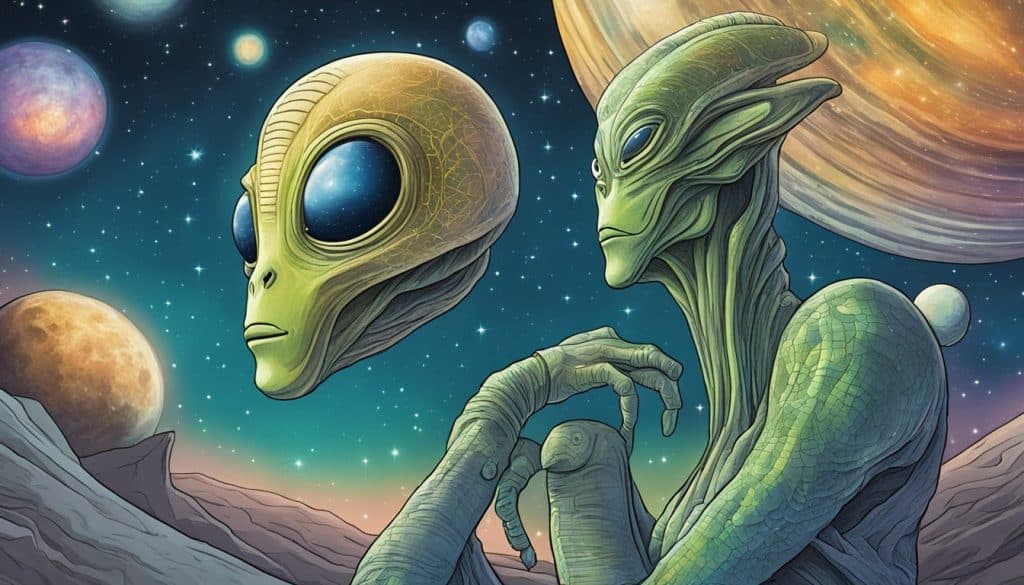Throughout history, humanity has looked to the stars and pondered the existence of life beyond Earth. This curiosity has manifested in countless ways, one of which is the phenomenon of alien dreams. These are not just fantastical visions conjured by the sleeping mind; they often reflect deep-seated questions about our place in the universe. As an expert on aliens, I can tell you that these dreams may be more than mere nighttime narratives—they can inspire scientific inquiry and philosophical thought about extraterrestrial life and our connection to it.
Table of Contents
Toggle
The study of astrobiology takes these questions from the realm of dreams into scientific research, exploring the possibility of life on other planets. The implications of discovering extraterrestrial life are profound, raising questions about our uniqueness and prompting a philosophical search for cosmic meaning. It is not just about finding aliens; it is about understanding the broader context of our existence. Human curiosity drives us to search for answers, ensuring that the pursuit of knowledge about alien life continues to be a significant aspect of our quest to understand the cosmos.
Key Takeaways
- Alien dreams can inspire scientific and philosophical exploration of our place in the universe.
- Astrobiology actively investigates the possibility of extraterrestrial life, with significant implications.
- The search for cosmic meaning is an ongoing human endeavor informed by both science and philosophy.
The Phenomenon of Alien Dreams

Alien dreams often encapsulate profound experiences, leading to vivid recall and introspection. These are not mere night-time wanderings of the subconscious mind; they are influential in both psychological interpretation and cultural discourse.
Psychological Interpretations
Dream Analysis: Experts in psychology view alien dreams through various lenses, including Jungian thought, where such dreams might represent the Unknown or aspects of self yet to be acknowledged. You may find that alien encounters in dreams are symbolic, often standing as metaphors for innovation, change, or the feeling of alienation.
Emotional Resonance: These dreams can elicit strong emotions. It’s important to consider the emotional context of your alien dreams—fear, wonder, or even a sense of longing might inform their underlying meaning. For instance, if you dream of a peaceful encounter, it may reflect a desire for new understanding or companionship.
Cultural Impact and Collective Consciousness
Media Influences: The portrayal of aliens in media has a significant impact on your subconscious. Consider the classic 1947 Roswell incident and its subsequent representation in film and literature. These narratives can seed ideas that later sprout in your dreams as interactions with extraterrestrial beings.
Symbolism and Archetypes: Alien dreams may contribute to a collective cultural understanding, evolving into modern mythologies. They act as vessels carrying shared concerns about the future, technology, and our place in the universe, influencing collective beliefs and values.
Alien dreams can be a gateway to exploring your inner psyche and reflecting on societal issues. They embody personal and collective quests for meaning in a vast, unknown cosmos.
Astrobiology and the Possibility of Extraterrestrial Life

Astrobiology examines the potential for life in the universe by incorporating disciplines such as biology, chemistry, and astronomy. This field is key to understanding whether we’re alone in the cosmos and how alien organisms might survive in environments different from Earth.
Habitability and the Search for Exoplanets
As your gaze turns to the skies, astrobiology guides you in understanding the factors that make a planet capable of supporting life. The search for exoplanets, planets outside our solar system, hinges on the concept of the habitable zone or “Goldilocks zone”—the region around a star where conditions might be just right for liquid water, a crucial ingredient for life as we know it.
Scientists utilize space telescopes, such as the now-retired Kepler and the current Transiting Exoplanet Survey Satellite (TESS), to identify these worlds. Here are some specifics:
- Size and Composition: Rocky planets similar in size to Earth are prime candidates for habitability.
- Atmospheric Conditions: A stable atmosphere with possible traces of gases like oxygen could indicate biological activity.
- Orbital Stability: A consistent orbit without extreme variations promotes a stable climate.
Through these criteria, a growing catalog of exoplanets emerges, each analyzed for its potential to harbor life.
Communication with Extraterrestrial Intelligence
In the quest to contact extraterrestrial intelligence, you should be aware of the efforts to send and decode potential messages from intelligent alien species. The Search for Extraterrestrial Intelligence (SETI) utilizes radio telescopes to listen for artificial signals sent through the vastness of space.
While no confirmed signals have been detected yet, projects like the Breakthrough Listen initiative rigorously scan the skies, applying the following methods:
- Monitoring Stars: Especially those with identified habitable exoplanets, for non-natural radio waves.
- Signal Analysis: Algorithms differentiate between terrestrial interference and potential extraterrestrial signals.
- Messaging Attempts: Including the Arecibo message, which was sent out as a demonstration of human technological achievement.
If life exists beyond Earth, understanding its biological viability and establishing communication are vital first steps in unraveling cosmic conundrums surrounding our existence in the universe.
Philosophical Perspectives on the Search for Cosmic Meaning

In your quest to understand the cosmos, you’ll find that philosophy offers unique tools for contemplating cosmic meaning. Different philosophical frameworks approach the existential questions raised by the vast universe in varied ways.
Existentialism and the Cosmos
Existentialist philosophy suggests that you must create your own meaning in an indifferent universe. The cosmos, vast and seemingly apathetic to human concerns, doesn’t provide meaning—it’s your responsibility to forge it through your choices and actions. Consider the words of Jean-Paul Sartre, “Man is condemned to be free; because once thrown into the world, he is responsible for everything he does.” It is your principal task to navigate the cosmos, accepting its absurdity without despair.
- Key Tenets:
- Individual existence
- Personal freedom
- Responsibility
The Role of Religion and Mythology
Religion and mythology often intersect with your search for cosmic meaning. These systems offer narratives and frameworks that help you interpret the universe and your place within it. Ancient mythologies, for example, present the cosmos as a tapestry woven by deities, attributing cosmic occurrences to the actions and wills of gods.
Religious Views:
- Cosmos as creation of a divine power
- Human life as part of a predetermined plan
Mythological Views:
- Deities as personifications of cosmic principles
- Myths as explanatory tools for natural phenomena
In embracing such narratives, you find solace and answers to the mystifying aspects of the universe, grounding your existence in a larger, often spiritual, context.
Frequently Asked Questions

Exploring the subconscious can uncover many underlying themes present in your life. Here you’ll find explanations for common queries regarding otherworldly motifs in dreams.
What is the interpretation of dreams featuring extraterrestrial encounters?
When you dream of extraterrestrial encounters, it often symbolizes the unknown aspects of your psyche or the feeling of confronting new, unconventional ideas. It may also reflect a sense of curiosity or fear about the unexplored territories of your life.
How do dreams about space travel relate to our search for meaning?
Dreams about space travel may indicate a desire for adventure and discovery in your life. They can express your pursuit of knowledge and your ambition to reach beyond your current limitations to find a deeper understanding of your existence.
What psychological significance could dreams of cosmic destruction have?
If you dream of cosmic destruction, such as the world ending or planets colliding, this may represent feelings of anxiety or chaos in your personal life. It could signify a transformative period where old structures are breaking down to make way for new growth.
Could there be a connection between sci-fi elements in dreams and real-life influences?
Sci-fi elements in your dreams, like advanced technology or futuristic scenarios, can be tied to real-life influences. Your consumption of science fiction media or your interest in technological developments and their societal impact might manifest in your dream landscape.
How might dreams about the end of the world reflect our subconscious fears or desires?
Dreams about the end of the world might be a mirror to your subconscious fears regarding change, loss of control, or the uncertainty of the future. Conversely, they may reveal a desire for a fresh start or a profound transformation in your life.
What cultural or historical elements influence dreams about alien phenomena?
Your dreams about alien phenomena can be shaped by cultural and historical elements, such as popular media depictions of aliens, historical events linked to UFO sightings, or collective myths. These elements often represent the merging of the individual subconscious with the collective understanding of the unknown.






